The opening ceremony and plenary session of the 2023 Economics Editor in Chief Meeting were successfully held at Beijing Jiaotong University
The opening ceremony and plenary session of the 2023 Face-to-Face Meeting of Economic Editors were successfully conducted from 8:00 pm to 11:00 pm on June 20, 2023. Hosted by the School of Economics and Management at Beijing Jiaotong University, the event was co-organized by Elsevier and the Management Home Forum. The gathering saw the participation of seven esteemed Editors-in-Chief from top journals in the field of economics, engaging in comprehensive exchanges with domestic experts and young scholars on journal submissions and cutting-edge research.
The meeting, conducted through various platforms including Zoom online meetings, Elsevier live streaming, and Management Home live streaming, featured two main segments. The first part comprised a plenary meeting where the seven chief editors presented insights into their respective journals, addressing topics such as writing, submission, and the publication of high-level academic research. The second part included seven special lectures, each featuring an Editor-in-Chief sharing cutting-edge research, with two distinguished domestic and foreign scholars providing precise comments.
The seven major economic journals encompassed the American Economic Review, Journal of Political Economy, Journal of Economic Theory, Journal of Financial Economics, Journal of Urban Economics, International Journal of Industrial Organization, and Journal of Development Economics, covering areas such as economics, political economics, theoretical economics, financial economics, urban economics, and industrial organization.
The invited Editors-in-Chief included Erzo F.P. Luttmer of the American Economic Review and Professor of Economics at Dartmouth College, John List of the Journal of Political Economy and Professor of Economics at the University of Chicago, Faruk Gul, Honorary Professor of Economics at Princeton University and Editor-in-Chief of the Journal of Economic Theory, Toni White, Professor of Business Administration at the Ross School of Business at the University of Michigan, Gilles Duranton, co-editor of the Journal of Urban Economics and Chair Professor at the Wharton School of Business at the University of Pennsylvania, Ginger Jin, Professor of Economics at the University of Maryland Park and co-editor of the Journal of Development Economics, and Shing Yi Wang, Associate Professor of Business Economics and Public Policy Research at the Wharton School of Business at the University of Pennsylvania.
During the plenary meeting, the seven chief editors engaged in discussions on academic writing, submission processes, and publication matters, fostering exciting interactions with participants on topics such as high-quality paper standards, benchmarking journal themes, revision suggestions, and more. The response was overwhelmingly positive, with a total attendance of 13,288, including 288 from the Zoom conference room, 9,400 from Elsevier, and 3,600 from the Management Home.
The opening ceremony of the meeting was skillfully presided over by Professor Wang Yacan from the School of Economics and Management at Beijing Jiaotong University. The inaugural address was delivered by Vice Dean Shang Xiaopu from the same school, who expressed heartfelt gratitude to the esteemed guests in attendance. Vice President Shang Xiaopu noted that this year's Editor-in-Chief Face-to-Face Meeting not only continued the tradition of article submissions and the exchange of cutting-edge research from previous years but also broadened the scope to include the Economics Summit. The entire conference, he emphasized, had ascended to a new and elevated stage. He expressed the hope that the conference would persist in offering an efficient and robust platform for academic exchange among domestic and international scholars, researchers, as well as university teachers and students.

Presided over by Professor Wang Yacan from the School of Economics and Management at Beijing Jiaotong University
Following this, Ms. Bethan Keall, Director of Elsevier Economics Publishing, was honored with an invitation to deliver a speech. Ms. Keall expressed her sincere gratitude to all participants and provided a comprehensive overview of a series of economics journals within the Elsevier portfolio. She underscored the notable growth in the number of articles published by Chinese scholars in the Elsevier Journal of Economics in recent years, highlighting the pivotal role played by Chinese authors in advancing the development of the journal.
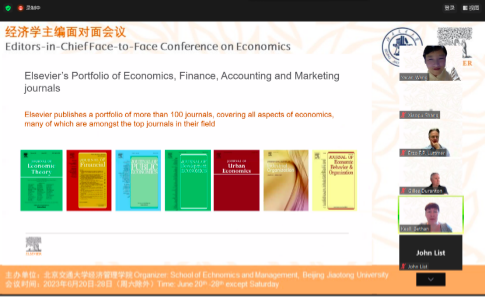
Speech by Ms. Bethan Keall, Director of Elsevier Publishing
After the opening ceremony, the conference seamlessly transitioned into the plenary session, featuring presentations from the seven distinguished editors. The first to address the audience was Professor Erzo F.P. Luttmer, the Editor-in-Chief of the American Economic Review, a renowned journal in the field. Professor Luttmer provided a comprehensive overview of the development, operations, and review policies of both the American Economic Review and the American Economic Journal: Economic Policy. Highlighting the necessity of adapting to globalization trends, Professor Luttmer shared insights into the editorial team's efforts to expand and recruit additional board members from Europe and China. He advised authors to carefully review the journal's submission policies, emphasizing the importance of transparency, innovation, and the quality and completeness of research in paper writing. Professor Luttmer concluded by encouraging authors to seek information and suggestions from multiple sources, fostering a thorough and well-informed approach to their work.
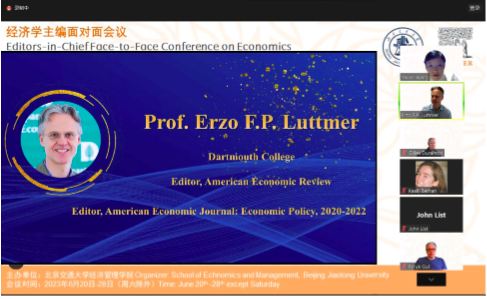
Speech by Professor Erzo F.P. Luttmer, Editor in Chief of American Economic Review
The second speaker in the plenary session was Professor Faruk Gul, serving as the Editor-in-Chief of the Journal of Economic Theory, acknowledged as a leading journal in theoretical economics. Professor Gul conveyed the journal's openness to various types of theoretical economics manuscripts, particularly those rooted in theory yet enriched with empirical factors. Emphasizing the journal's focus on theoretical economics with a preference for microeconomic theory, he highlighted specific subfields such as mechanism design, information economics, and behavioral economics. Additionally, Professor Gul expressed the journal's interest in areas like political economy and finance.While noting the absence of a specific theoretical research paradigm, Professor Gul underscored the requirement for submitted papers to feature a certain theoretical model. In encouraging innovation, he cautioned potential contributors against deviating too far from existing literature, as excessive deviation may raise concerns among reviewers. Professor Gul concluded by providing insights into the efficient review process employed by the journal and encouraging scholars to actively submit their contributions.

Speech by Professor Faruk Gul, Editor in Chief of Journal of Economic Theory
The third speaker, Professor Toni White, assumed the role of Editor-in-Chief for the Journal of Financial Economics, a premier journal in financial economics. Professor White delved into the journal's review process and highlighted its efficiency, elucidating the overarching goals and scope of articles published. She underscored the substantial expansion of the financial economics research field, spanning diverse areas such as capital markets, corporate finance, corporate governance, macro finance, behavioral, and household finance. Acknowledging the growing significance of financial intermediaries and fintech, Professor White suggested that journals might broaden their coverage in response to these trends. In providing guidance on successful paper publication, Professor White emphasized three key standards: the paper's ability to stimulate readers' interest, its contribution to the research field, and its apt execution of research and writing. These criteria, she emphasized, are crucial for a paper's success in the highly competitive realm of financial economics.
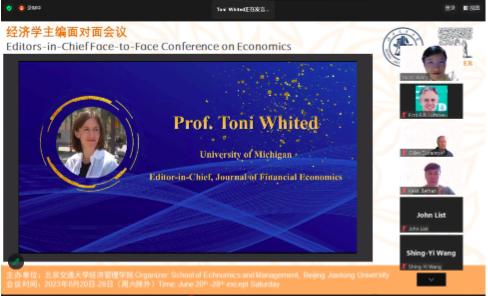
Speech by Professor Toni White, Editor in Chief of Journal of Financial Economics
The fourth speaker, Professor Gilles Duranton, co-Editor-in-Chief of the Journal of Urban Economics, highlighted the journal's extensive research into the reciprocal relationship between economic activities and urban development. He specifically noted the crucial importance of China in the realm of urban economic research, citing the global attention garnered by China's urbanization process over the past 30 years. The rapid pace of urbanization in China, Professor Duranton asserted, has presented both new opportunities and challenges across various facets of people's lives.Professor Duranton further detailed the workflow and submission policy of the journal, emphasizing the encouragement for researchers to submit high-quality articles with clear research questions, compelling conclusions, and novel contributions to the field. He stressed the need for submitted articles to be highly focused on how economic activities impact urban development and how cities, in turn, influence economic activities. This targeted approach, he noted, enhances the relevance and impact of the research published in the Journal of Urban Economics.
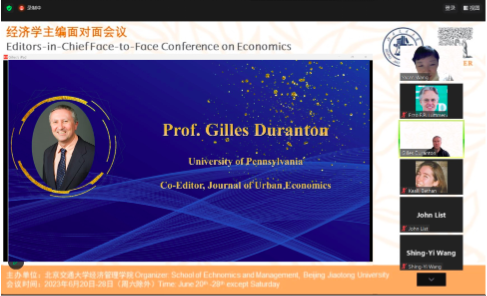
Speech by Professor Gilles Duranton, Joint Editor in Chief of Journal of Urban Economics
The fifth speaker, Professor Ginger Jin, Executive Editor-in-Chief of the International Journal of Industrial Organization, a preeminent publication in industrial organizations, elucidated the essence of industrial organization and outlined the scope of the journal's solicitation. Professor Jin conveyed the journal's enthusiasm for original research in areas encompassing antitrust policy, intellectual property protection, and price regulation. She expounded upon the development goals, review process, and the criteria for article quality, stressing the journal's elevated standards for the importance and interest of research issues, contributions to the existing literature on industrial organizations, and clarity of expression. Professor Jin actively encouraged researchers with relevant interests to submit their work to the journal, underscoring the commitment to fostering impactful research in the field of industrial organization.
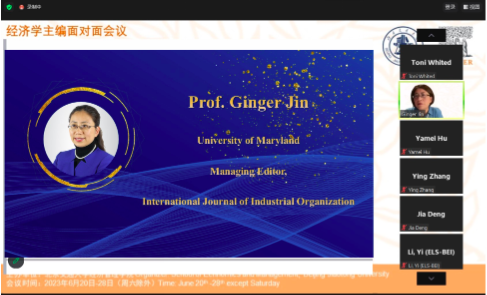
Speech by Professor Ginger Jin, Executive Editor in Chief of International Journal of Industrial Organization
The sixth speaker, Associate Professor Shing Yi Wang, co-Editor-in-Chief of the Journal of Development Economics, provided insights into various aspects of the journal, including its manuscript acceptance rate, review process, and selection criteria. She underscored the significance of key elements in a well-crafted paper, emphasizing the need for a clear abstract and introduction. Professor Wang elucidated the considerations made by the Editor-in-Chief during the manuscript evaluation process, highlighting the importance of alignment with the journal's positioning, relevance to developing countries, and appeal to development economists. Emphasizing the crucial role of empirical methods, she recommended authors provide a clear exposition of their empirical strategies, covering aspects such as data, estimation methods, and identification strategies. Furthermore, Professor Wang encouraged authors to incorporate a discussion of existing literature in their articles, explicitly indicating how their research addresses gaps in previous studies. In addressing articles requiring significant revisions, she advised authors to thoughtfully consider reviewer comments and thoroughly revise their work before resubmission. This comprehensive approach, she noted, contributes to the overall quality and impact of the submitted research.
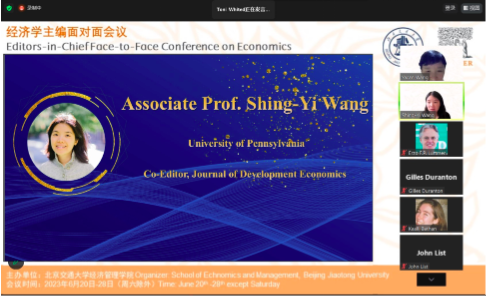
Speech by Associate Professor Shing Yi Wang, Co Editor in Chief of Journal of Development Economics
The seventh speaker, Professor John List, Editor-in-Chief of the Journal of Political Economy, delivered an in-depth presentation on the journal's review process, distinctive features, and various subsections. In addition to providing insights into the unique aspects of the journal, Professor List generously shared five valuable writing and submission techniques. These techniques encompassed the importance of establishing causal relationships in the paper, clearly defining research questions, emphasizing policy implications or theoretical contributions, and considering the impact of other complex factors on research conclusions. Professor List underscored that these suggestions are rooted in his personal opinions and experiences, acknowledging that each author possesses their own distinctive writing and research methods. He encouraged authors to follow the path they believe is optimal for their work. Expressing anticipation for outstanding research contributions from scholars, Professor List extended his enthusiasm for submissions to both the main Journal of Political Economy and its microeconomics edition.
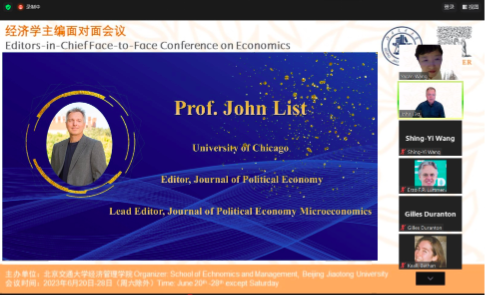
Lecture by Professor John List, Editor in Chief of Journal of Political Economy
After the seven invited editors presented their journal features and submission suggestions, the meeting seamlessly transitioned into a 40-minute interactive session. Participants actively engaged by posing questions through the Zoom conference room and academic exchange group, fostering detailed discussions and exchanges between the editors and attending scholars, researchers, as well as university teachers and students. The interactive session covered a range of topics including research inquiries, model building, and considerations for submissions. With this vibrant exchange of ideas, the plenary meeting reached a successful conclusion, marking the end of a fruitful and informative session.
The 2023 Economic Editor-in-Chief Meeting represents the third installment following the successful convening of the first and second Economic Editor-in-Chief Meetings in June 2021 and June 2022. It is also a key component of the ongoing "Editor-in-Chief Meeting" series initiated by the School of Economics and Management at Beijing Jiaotong University since 2018. Notably, the face-to-face meeting of economic editors has expanded the scope of the "Editor-in-Chief face-to-face" initiative beyond the traditional field of transportation research to encompass a broader range of economic research fields. This year's meeting extends its coverage to top economic journals, evolving from previous inclusion of Elsevier Group journals to encompass non-Elsevier classic economic journals. This expansion not only complements the research strengths in transportation at the School of Economics and Management at Beijing Jiaotong University but also establishes an effective international academic platform tailored for domestic and foreign economists, researchers, and university teachers and students. The plenary session, as the inaugural event of the 2023 face-to-face meeting of economics editors, facilitated precise coordination, enabling participants to grasp the research positioning of top economics journals, delve into the latest topics of concern, understand the submission and review process, and gain insights into writing and submission considerations. Moreover, it set the stage for a series of editor-in-chief special lecture activities, fostering a robust communication and interaction mode for future events.
The Editor-in-Chief Plenary Meeting, successfully concluded on June 20th, and the upcoming Editor-in-Chief Special Lecture Series, scheduled from June 21st to 28th, are set to synergistically enhance a platform for domestic and foreign economic research and exchange. This initiative aims to offer multiple avenues and practical international research and exchange channels for scholars, experts, teachers, and students from major domestic universities, with a particular emphasis on supporting young scholars in China.
Through the consolidation of an international platform for high-level academic research, exchange, and publication, this effort seeks to effectively advance the localization of academic research. It also aims to diversify communication channels, expand the space for scholarly discourse, and enhance the international academic influence of disciplines. These initiatives collectively contribute to fostering a dynamic and interconnected global network for economic research and collaboration.















